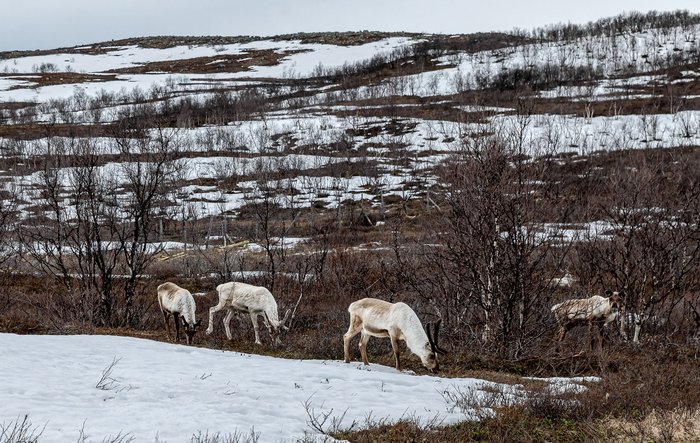
Credit: https://www.flickr.com/photos/ninara/51261943034/
Ninara/flickr
WASHINGTON — Today, more snow than rain falls in the Arctic, but this is expected to reverse by the end of the century. A new study shows the frequency of rainy days in the Arctic could roughly double by 2100.
The Arctic is the northernmost region of the Earth, encompassing the Arctic Ocean and northernmost parts of Alaska, Canada, Russia, and Greenland.
As the planet warms, more frequent and intense Arctic rainfall events are expected to encroach farther toward the center of the Arctic Ocean and inland Greenland, “which means the arrival of a new Arctic,” said Tingfeng Dou, a climate scientist at the University of Chinese Academy of Sciences and lead author of the new study. The study was published today in Earth’s Future, AGU’s journal for interdisciplinary research on the past, present and future of our planet and its inhabitants.
“In the past, rainfall was primarily limited to the edges of the Greenland ice sheet,” Dou said. “In the future, this will radically change because rainfall will expand further into inland locations and be a catalyst for further ablation of the ice sheet.”
The shift to a rainier Arctic is expected to increase permafrost melt, releasing massive amounts of greenhouse gases, and to speed up the loss of sea ice cover, which will likely trigger consequences for Arctic ecology and Indigenous peoples, as well as communities around the world. (Antarctica is predicted to undergo a similar doubling of raininess by 2100 under a high-emissions scenario.)
“Even ordinary rainfall can be regarded as an extreme event in polar regions,” Dou said. This is because rain-on-snow events, which occur when rain falls onto an existing snowpack and freezes into an ice crust, impact wildlife, infrastructure and local communities.
“The number of reindeer deaths caused by a single rain-on-snow event could range from several hundred to thousands,” Dou said, because their food becomes trapped under an icy layer. Massive die-offs of reindeer can have local socioeconomic impacts, particularly in regions where people rely on reindeer for food, clothing and transportation.
Few studies have examined the frequency and intensity of Arctic rain, so little is known about how those factors will change in the near future. Dou and his co-authors used climate models to detail future changes in rainfall frequency and intensity under a high level of greenhouse gas emissions from 2015 to 2100.
The increasing frequency, intensity and extent of rainfall events are mainly caused by faster local warming rates, which in the Arctic are “two to three times that of the global average,” said Cunde Xiao, an Earth scientist at Beijing Normal University and co-author of the study. “This is a serious cause for alarm.”
They also find the onset of spring rainfall is projected to occur three months, or a season, earlier than present-day in the Chukchi Sea and the Northern Barents Sea.
“Once the transition from snow to rainfall becomes common, it will have a far-reaching impact on the Arctic ice and snow process and hydrological ecology,” said Xiao. “This will also strongly amplify the warming of the Arctic, making it a major issue worthy of global attention as it can have global consequences.”
###
AGU (www.agu.org) supports 125,000 enthusiasts to experts worldwide in Earth and space sciences. Through broad and inclusive partnerships, we advance discovery and solution science that accelerate knowledge and create solutions that are ethical, unbiased and respectful of communities and their values. Our programs include serving as a scholarly publisher, convening virtual and in-person events and providing career support. We live our values in everything we do, such as our net zero energy renovated building in Washington, D.C. and our Ethics and Equity Center, which fosters a diverse and inclusive geoscience community to ensure responsible conduct.
Notes for Journalists:
Earth’s Future is an open access journal. Download a PDF copy of the paper here. Neither the paper nor this press release is under embargo.
Paper title:
“More frequent, intense and extensive rainfall events in a strongly warming Arctic”
Authors:
- Cunde Xiao (corresponding author), State Key Laboratory of Earth Surface Processes and Resource Ecology, Beijing Normal, University, Beijing, China
- Tingfeng Dou, College of Resources and Environment, University of Chinese Academy of Sciences, Beijing, China
- Collaborative Innovation Center on Forecast and Evaluation of Meteorological Disasters (CIC‐FEMD)/Key Laboratory of Meteorological Disaster, Ministry of Education (KLME)/Joint International Research Laboratory of Climate and Environment Change (ILCEC), Nanjing; University of Information Science and Technology, Nanjing, China
- Richard Bintanja, Royal Netherlands Meteorological Institute (KNMI), Utrechtseweg 297, 3731 GA, De Bilt, The Netherlands Energy and Sustainability Research Institute Groningen (ESRIG), University of Groningen, Nijenborgh 6/7, 9747 AG, Groningen, The Netherlands
Journal
Earth s Future
DOI
10.1029/2021EF002378
Article Title
More frequent, intense and extensive rainfall events in a strongly warming Arctic
Article Publication Date
3-Oct-2022




